Forging a culture of renewal and accountability
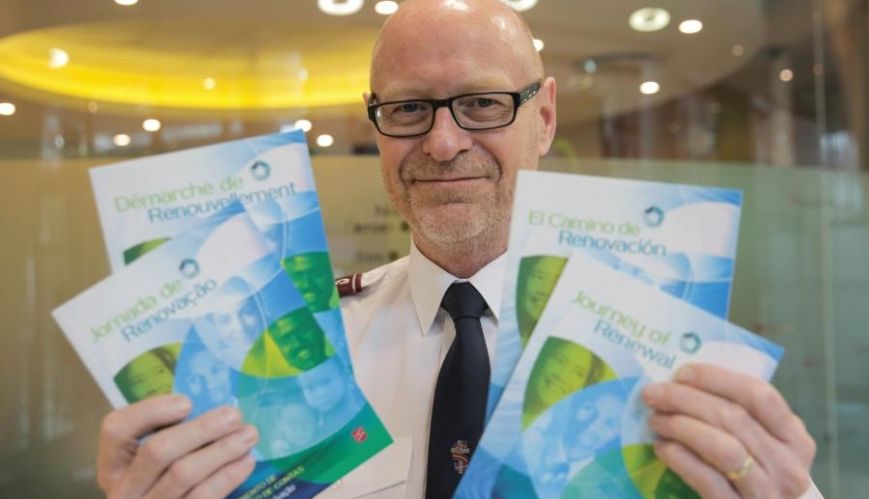
Forging a culture of renewal and accountability
3 April 2018
Commissioner Robert Donaldson, International Secretary for Governance and Accountability, with copies of the Journey of Renewal booklet, which has been translated into a variety of languages and is being distributed around the world.
There is a common idiom used in the island-nation of Sri Lanka that comprises a question posed and an answer given in just four Sinhala words: “Koheda yanne? Mallé pol”– “Where are you going? There are coconuts in my bag.”
To the unsuspecting visitor it may seem an absurd saying but is hilarious when you hear a Sri Lankan in full flight using it to describe someone who has no idea what they are doing or where they are going, or who needs help but is too proud to ask, or who is struggling to avoid scrutiny. “Koheda yanne? Mallé pol” rolls off the tongue and everyone laughs uncontrollably, like it’s on cue. 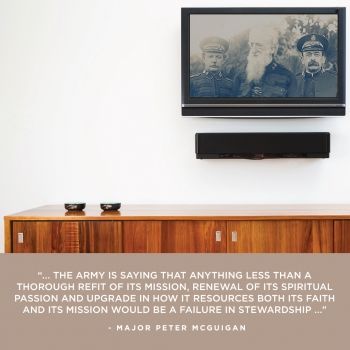
The truth is that the saying, like many colloquialisms from across the world, has a serious undertone related to accountability or the apparent lack of it – accountability meaning the ability to give an account. In Sri Lanka, you often hear “Koheda yanne? Mallé pol” used with a sense of resignation in reference to the performance of politicians and political parties. People may laugh, but everyone gets the pun.
“Where are you going?” is a key question facing all organisations in today’s climate of rapid technological and social change.
It is particularly key for organisations born in another era that struggle with how to present themselves and how to articulate their identity in this brave new world, or whose systems of governance and accountability have fallen behind the new standards of transparency, holistic stewardship, equality and open collaboration.
The former United States President, John F. Kennedy, prophesied into this reality when he said more than 50 years ago on the eve of what we now know as the digital revolution: “Change is the law of life. And those who look only to the past or present are certain to miss the future.”
Journey of renewal
The Salvation Army, with the long-term viability of its worldwide mission at heart, is one organisation that is facing the challenges head-on and which has embarked on a self-proclaimed “Journey of Renewal”, a campaign launched by the Army’s world leader General André Cox in 2016. As part of this journey, all aspects of the Army’s spiritual and missional life are coming under the microscope of accountability and all Salvation Army personnel have been called to participate in a global Accountability Movement.
“The great hope of Journey of Renewal,” says Commissioner Robert Donaldson, International Secretary for Governance and Accountability, “is that across the world, in every place, The Salvation Army will be engulfed by a new vitality in the experience and expression of its faith, and fresh energy to serve the world. We envision a new level of passion and heightened awareness – globally and locally – to share the transforming love of God in Jesus, eliminate poverty, safeguard the vulnerable, and ensure contemporary best practice in all our systems and processes.”
Commissioner Floyd Tidd, National Commander of The Salvation Army in Australia, describes how the Journey of Renewal has meant the merging of the Australia Eastern and the Australia Southern territories into one national territory. “‘Where are you going?’ has been a key question for us, and one of the key focuses of our journey has been the stewardship of our resources, both human and material,” Commissioner Tidd says. “We looked at the duplication of resources through the existence of two independent administrations in Australia, and, after extensive consultation, realised that we could no longer continue as we were and be up front with Australians that we are stewarding our organisation in the best way possible. A change was well overdue, and, with International Headquarters’approval, we will be operating as one territory by 1 January 2019.
“It will no longer be one plus one equals two, but one plus one equals new! We are implementing changes that align with and take their lead from The Salvation Army’s international Accountability Movement. The result will be a Salvation Army in Australia that is fit for purpose in the 21st century. That means an aligned vision, a united voice, increased innovation, stronger partnerships, better stewardship and, most importantly, greater impact. It also means that we will continue to adapt and continue to change into the future according to what is required of us to fulfil our mission with ongoing best practice.” 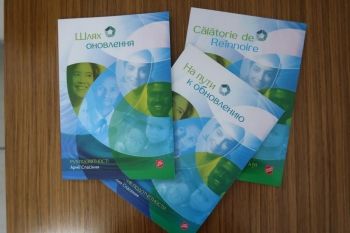
Fifteen thousand copies of the Journey of Renewal resource book (pictured right) have been printed and distributed throughout the world. Additionally, Journey of Renewal has been translated into more than 15 languages other than English. In the Eastern Europe Territory (EET) alone, this meant translation into four languages — Russian, Ukrainian, Romanian and Georgian. “We can see an increasing understanding among our people about the need for accountability in all areas,” says Colonel Magna Nielsen, Territorial Leader in EET with Colonel Jostein Nielsen. “Even before the book was translated, we used the Accountability Movement as the basis for planning our Territorial Mission Strategy 2016-2020. We have also held seminars in our countries about how Journey of Renewal can be used in our corps.”
Holiness unto the Lord
Thirty-eight territories, commands and regions – out of 62 worldwide – have commenced their Journey of Renewal since its launch. Importantly for Salvationists, taking this journey arises as much out of the Army’s foundational “holiness” focus as it does out of the universal need to adapt to the technological and sociological realities of the 21st century.
In effect, through Journey of Renewal, the Army is saying that anything less than a thorough refit of its mission, renewal of its spiritual passion and upgrade in how it resources both its faith and its mission would be a failure in stewardship and, therefore, a serious breach of its holiness tradition. “How could we continue to uphold the scriptural imperative ‘holiness unto the Lord’ if our own house was unfit to meet the needs of the hour?” says Commissioner Donaldson. “If the Army itself was unwilling to adapt its methods or open its heart to a fresh vision and passion for operating in the very different world of the 2010s; if we acquiesced to pluralism and commercialism, or failed to update our systems and became an incompetent Salvation Army, or became a proud Salvation Army in an age that values humility above all other qualities?”
Colonel Lee Graves, Chief Secretary of The Salvation Army’s Canada and Bermuda Territory, agrees: “We need to be accountable first to God through his Word,” said Colonel Graves in an interview published in the January 2018 issue of the territory’s Salvationist magazine. “In 2 Timothy 3:16-17, we learn that Scripture is inspired by God; it teaches us what is true and helps correct what is wrong in our lives. Our mission is the gospel of transformation and the biblical text holds us accountable.
“We also need to be accountable to each other,” Colonel Graves added. “I believe accountability in this territory begins at the top, between the territorial commander and the chief secretary. We need to model it at the highest level. My hope is that it reverberates through the ranks so that leadership at every level is an example of accountability.
“Lastly, it is important for us to uphold the laws of the land. Scripture calls us to pray for those in authority and render unto Caesar what is Caesar’s. Sometimes legislation is imposed that adds an aspect of complexity to our work, but we must nevertheless be compliant with government regulations.”
Refocusing the mission
Commissioner Donaldson believes that any organisation impacted by the wholesale changes to society over the past five decades can remake itself and enjoy success in its core business, so long as it is willing to refocus and make hard decisions in the process. He notes how this is the subject of books such as Rick Warren’s Purpose Driven Church and how in the 2010s the Holy Spirit seems to be speaking across Christianity about the Church’s spiritual life and mission to the world being reborn. 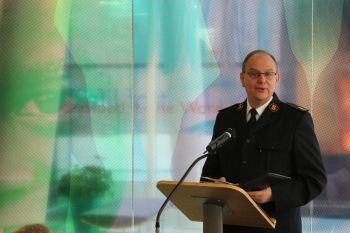
One case in point is how in 2013, at the same time General André Cox (pictured right) began talking about spiritual and organisational renewal in The Salvation Army, Pope Francis was calling the Roman Catholic Church to “refind” its mission to the poor. “Be shepherds with the smell of the sheep,” he challenged the church’s priests worldwide. “Bring the healing power of God’s grace to everyone in need. Stay close to the marginalised.” Similarly, Archbishop of Canterbury Justin Welby has made the renewal of prayer and religious communities of the Anglican Church his first priority, saying that it is through prayer that we find our true identity.
Commissioner Donaldson says that we can also learn from business and points to the American company Kimberly-Clark as a classic case of organisational transformation.
By 1971, the ageing paper company had fallen behind the general market by 36 per cent. However, that year the company began making tough decisions about its future that started with a revamp of its leadership team and the appointment of a new CEO. Within 20 years, cumulative stock returns lifted to 4.1 times greater than those of the general market.
At one point, the company made the highly controversial decision to move out of the coated paper business, sell all its mills, including the namesake mill in Kimberly, Wisconsin, and invest heavily in the consumer paper products business in brands like Huggies diapers and Kleenex tissues. Today, Kimberly-Clark and its global brands, with world headquarters in Dallas, Texas, reach 1.3 billion people across 178 countries every day.
“The membership statistics of our movement are not crash hot at the moment, particularly those of Western territories,” Commissioner Donaldson acknowledges. “But if it is possible for a declining paper company to re-create itself for the future and then go on to lead the world in providing solutions to people’s health, hygiene and well-being needs, why can’t an old oak of the Church transform itself from the inside out? ‘We have a Gospel that matches the hour’ wrote John Gowans in his well-known song. The central thrust of our Journey of Renewal is that we believe this with all our heart and will not hold back on doing everything necessary to make it a living, transforming reality in the villages, towns and cities of our world.”
Commissioner Donaldson says that this includes letting go of any reluctance that might exist among us to admit our need for change, our need for help to take the journey, or our deeper need to humble ourselves before God. And, where territories, divisions, corps or other expressions of The Salvation Army have stepped into the Journey of Renewal, there is evidence of positive transformation already showing, both within The Salvation Army and, through fresh vision and re-energised mission, in the world.
Progress
Many Salvationists, including international and territorial leaders, are buoyed by the difference in expectation and sense of direction that Journey of Renewal is bringing to The Salvation Army; to the tone of the Movement. Major Seth Le Leu, Principal Advisor for International Governance, uses the lyrics from a well-known Salvation Army song to describe progress in Africa. “The tide is now flowing,” says Major Le Leu. “It is exciting to see the way that the territories in our Africa Zone are really earning the right to be called the ‘first adopter zone’. Zambia has pioneered the way with non-executive directors as trustees of the Army. The two Kenyan territories are hoping by the end of this year to have moved to the new governance model.
“Just last week, I was with the territorial executive team in Kenya East. The size of this territory is truly phenomenal with 70 members on the team, representing more than 85,000 soldiers, 79,000 junior soldiers, nearly 700 corps and outposts, and 372 schools. The governance logistics are huge. All 70 members of the executive engaged in deep and lively discussion on the key governance principles. More than anything else, the team really appreciated that governance change is for all levels of the organisation. Other territories like Tanzania, Uganda, Mozambique and South Africa are all at different points in their governance journey.”
In other parts of the world progress is similar, yet different. Commissioner Alistair Herring, also Principal Advisor International Governance, says that even though territories are signing up for renewal and accountability, it is only as the Journey of Renewal comes to a territory that its necessity becomes obvious. “The lights go on for many people,” says Commissioner Herring, “about the connections between the theology of accountability and how changes in structures and systems will facilitate a journey of renewal –the development of a Christlike culture.
“Use of the book Journey of Renewal is also making a big difference in many places in terms of the Holy Spirit opening the hearts and minds of our people, preparing them for accountability. Within my experience of just the past four months in the territories I have visited — The Philippines, Pakistan, India, Sri Lanka, Russia Command, Taiwan Region, Eastern Europe, Finland and Estonia, and Singapore, Malaysia and Myanmar — all have responded positively to the need for changes in governance and management structures and processes, and have commenced the journey. On the basis of these experiences, I expect something quite similar may happen in upcoming visits to Latin America North, Brazil, South America West and Papua New Guinea.”
Commissioner Herring says he has noticed the spiritual impact on territories, using The Salvation Army in Finland and Estonia as an example. “My impression is that the Finland and Estonia Territory is experiencing a wave of new energy coming out of their focus on the book which they have discussed extensively, and also through accountability and governance workshops. They have already done most of the work for a governance charter and aim to have new governance structures and systems up and running by September.”
The Governance and Accountability team anticipates that by September 2018 at least 12 territories will have new governance charters and boards in place and within 18 months that figure will be well above 30.
Consultation and agreement
For an organisation the size of The Salvation Army, some of the changes involved in Journey of Renewal are monumental and, in some cases, mean that 150-year-old practices will disappear almost overnight. But the consultative process for Journey of Renewal and the Accountability Movement has been the most extensive ever undertaken in The Salvation Army, and the Army’s senior executives around the world are agreed on the importance of being spiritually and organisationally fit for the 21st century.
Discussion in almost all the territories and commands that the Accountability and Governance team is working with has led to agreement that:
- Pursuing renewal of both heart and vision is key to the future and protecting the vulnerable must be a top priority.
- Leadership and capacity development is critical to the health of the Army’s spiritual life and the impact of its mission in every place.
- Moving away from an autocratic form of leadership structure to one of shared processes and responsibility is safer for all and will lead to better decision-making.
- Refocusing the roles of the two most senior leaders of territories will be much more productive – the territorial commander on vision, strategy and accountability and the chief secretary on leading a team in implementation and management.
- The Salvation Army’s new finance system will bring much-needed capacity for transparency and clarity in reporting.
- Establishing a board of governance to oversee a territory’s or command’s life and mission, which includes soldiers and other non-executive directors, will be in fact best practice and the best decision they could take for the future – and “long overdue”.
There’s a new confidence beginning to show in the stride of The Salvation Army as, around the world, it musters the courage to boldly go where it has not gone before; to shed the old wine skins for the new. The bottom line is still “the whole world redeeming”, to use its founder’s own words. But one gets the feeling that right now for this globe-treading movement of God, transformation starts at home and a more humble, more formidable Salvation Army is about to emerge. 
Major Peter McGuigan (pictured right) is Communications and Public Relations Secretary for The Salvation Army Sri Lanka Territory.
Journey of Renewal resources
General André Cox launched Journey of Renewal, with the Accountability Movement as its action or sign-up space, in 2016.
“As its international leader,” said General Cox, “I am convicted to call The Salvation Army to spiritual and missional renewal. In a world of shifting values, we must be people of spiritual vitality and integrity, faithful and dynamic in mission. We should want to be accountable for our actions and attitudes as we participate in God’s mission to transform the world. We must be keen to learn from our successes, but also our failures. To address these vital concerns I am asking everyone linked to The Salvation Army to join an Accountability Movement.” 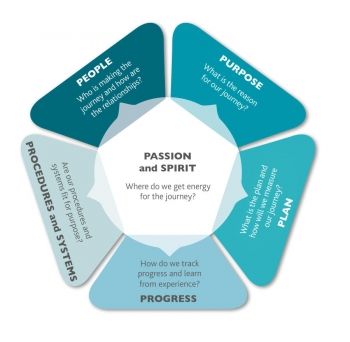
The book Journey of Renewal: The Accountability Movement of The Salvation Army introduces several primary tools of engagement. The first is the Mission Accountability Framework (MAF, see diagram, right ) that asks key questions across six vital mission components that are interconnected: People, Passion (and Spirit), Purpose, Plan, Progress and Procedures (and Systems).
Everyone in The Salvation Army can use the MAF, from individuals to groups and teams, divisions and territories. Journey of Renewal: The Accountability Movement of The Salvation Army has been translated into many languages other than English and is available worldwide. It is also downloadable from accountability.salvationarmy.org, the accountability movement website which is also an excellent resource.
The accountability pillars
The Accountability Movement comprises four pillars – Governance, Impact Measurement, Finance, and Child Protection – built on a foundation of “living Christ’s values” and supported by leadership development, capacity building and communication. 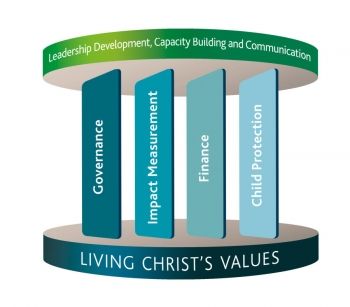
Governance: The International Headquarters (IHQ) governance team is currently working with 38 territories, commands and regions and IHQ itself towards the implementation of new governance structures. The two Australia territories and the New Zealand, Fiji and Tonga Territory are well advanced in piloting the new structures, while others are at different stages on the journey towards implementation.
Impact Measurement: Resources for measuring the impact of Salvation Army mission are in the development phase and, as soon as these are available, will be piloted and then shared as part of the accountability suite of resources.
Finance: The development phase for a new finance system is well advanced and aspects of the new system are already being introduced and training provided across the world.
Child Protection: Resources have been developed and approved, and training will be carried out throughout 2018 across the world. Where possible, the hiring of a suitably qualified child protection officer is being encouraged.
Living Christ’s Values: A recommended list of readily available resources is being prepared and will be circulated widely to promote spiritual renewal and empower our people across the movement.
Leadership and Capacity Development: Resources are in the development phase and some, particularly focused on mentoring/coaching, have been released to senior leaders across the zones. A new process of orientation for territorial leaders has been developed in collaboration with Booth University College, Canada, and is now being implemented, as are succession-planning tools. Further resources are being considered. A new book, The Leadership of Jesus, is about to be published by IHQ and will be available in hard copy and e-copy.